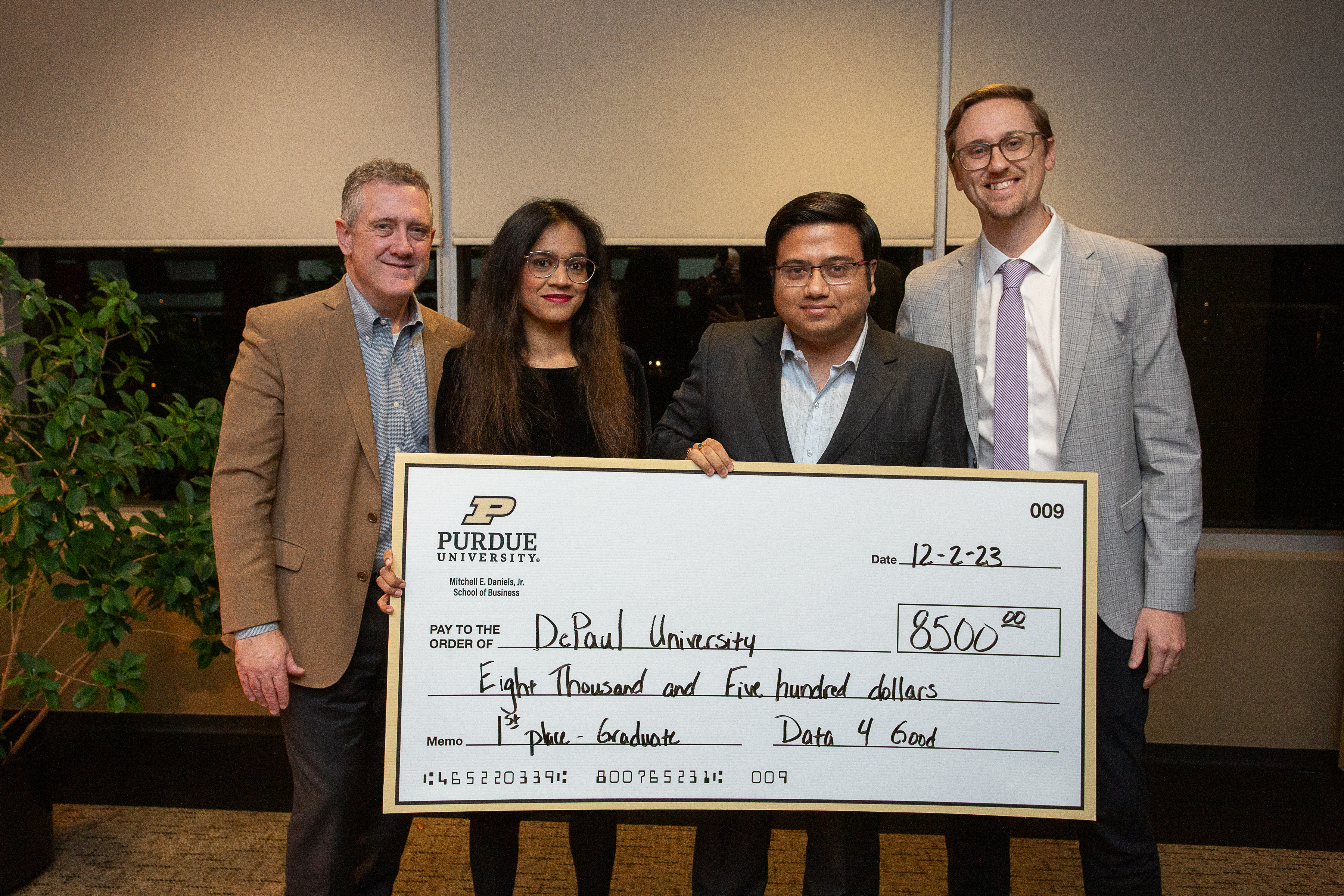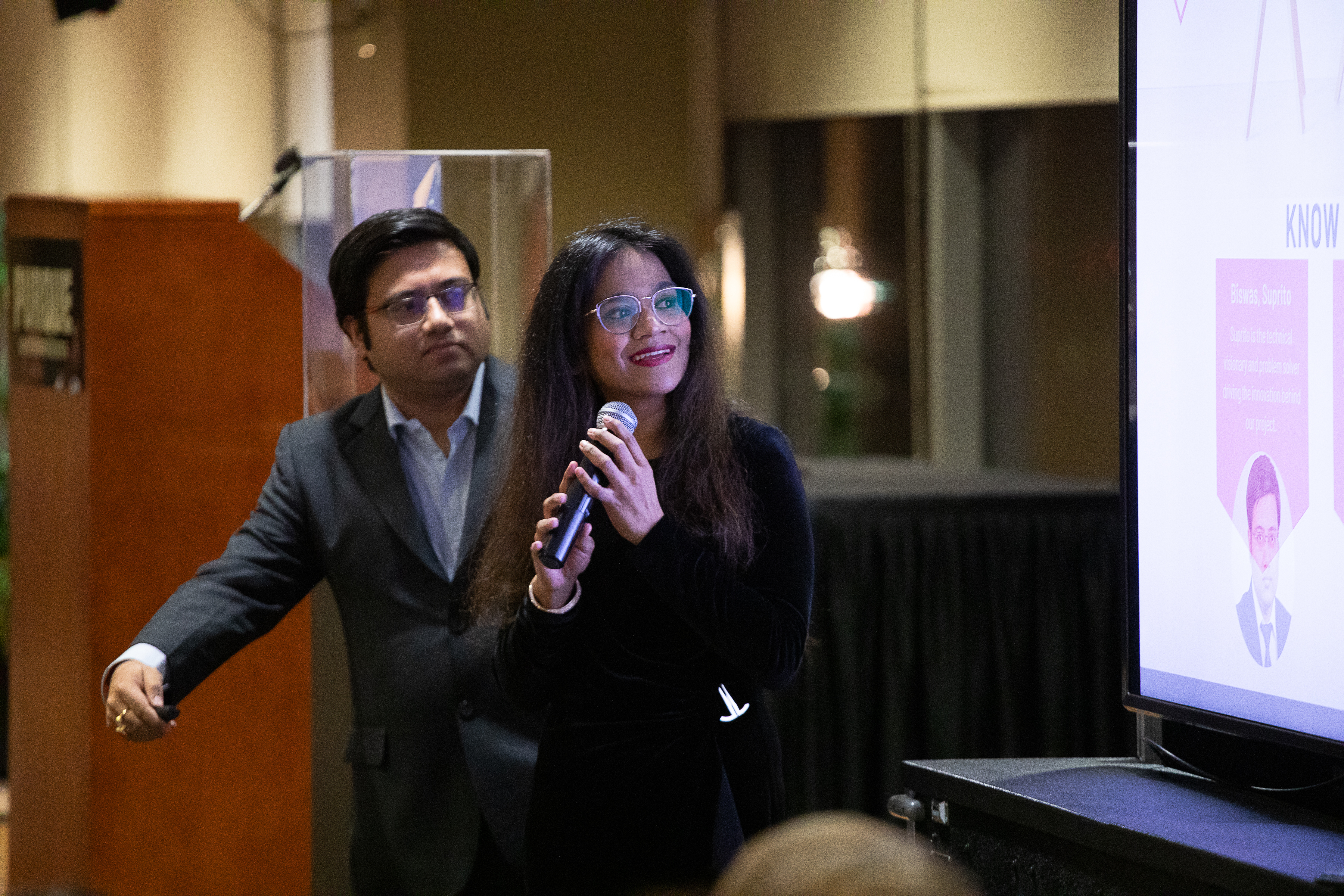 Syeda, second from left, and Biswas, second from right, celebrate their victory
Syeda, second from left, and Biswas, second from right, celebrate their victoryThe competition: An emerging technology, and a complex challenge
As Master i
n Business Analytics student Suprito Biswas sees it, business analytics brings together two distinct skillsets. “You have to be well-versed in data,” he said, “and you have to have business acumen.”
This duality drew Biswas to study at DePaul’s Kellstadt Graduate School of Business. It also encapsulates the approach Biswas and classmate Shafeeqa Syeda took to competing in – and winning – the 2023 Data 4 Good case competition.
“Suprito’s from a technical background; I’m from a managing background,” said Syeda, an interior designer who runs a nonprofit focused on empowering women in business. “I think that was the perfect blend and that made us an amazing team. We knew what our roles were; there was no clash of interests.”
Hosted by Purdue University, the Data 4 Good competition is a two-month-long national challenge with more than $45,000 in prize money at stake. The charge: Use a large language model — the form of artificial intelligence at play in tools like Chat GPT – to extract relevant information from health care records without sacrificing accuracy.
Biswas and Syeda christened their team K3. They were drawn in, they said, by the chance to apply their skills as business analysts to a real-world context. Guidance from Kellstadt faculty was key to their success.
“Professor [Sina] Ansari played a major role in guiding us through the project,” said Syeda. An assistant professor in the management and entrepreneurship department, Ansari has experience in the health care sector. “He was able to help us understand things we wouldn’t have thought of otherwise.”
The team put considerable effort into ensuring their solution kept sensitive data secure.
"Understanding the importance of data security — as a business analyst, that’s the most important thing you need to know,” said Syeda. “Someone’s trusting you with information that’s dear to them. You have to be really careful.”
Project management skills were just as important — another area where Syeda credits support from Kellstadt faculty, this time Assistant Professor of Management and Entrepreneurship Khadija Ali Vakeel.
Thanks to this support and their skills, team K3 emerged as regional champions in the Midwest: a region that comprised nearly 40% of the competition as a whole.
“Once we won the region,” Biswas said, “we knew we could potentially win the entire thing.”
Win they did.

The takeaways: A trail blazed and a friendship forged
For both students, the national win — an honor that comes with $6,500 in prize money on top of the $2,000 the team had already earned in their regional win — affirmed their passion for their chosen field of study.
“No matter what field you’re in, you eventually come around to business analytics,” said Syeda. “This competition has given us massive experience when it comes to understanding a different industry altogether.”
Syeda plans to continue integrating AI into her course of study; Biswas is considering enrolling in health care-related electives.
Both students hope that their success will blaze a trail for other Kellstadt students.
"We want students to know there’s a lot of opportunities out there,” said Syeda. Sharing their story, Syeda said, “feels like our way of giving back to other students so they don’t have to reinvent the wheel.”
“We want students to understand that they can do this too,” said Syeda. “We did this alongside being full-time students and being board members of student organizations, the Kellstadt Marketing Group and the Kellstadt Business Analytics Organization. There was a lot of stage-managing; there was a lot of balancing multiple roles. But this is not something to get scared of. You do get a little overwhelmed. This shows that other students can do this too.”
As much as data analysis, business acumen and project management skills all played a role in the team’s win, the biggest takeaway for both students was the same.
“Friendship is what drove us to this competition,” said Syeda, “and what kept us going.
“The fact that Shafeeqa and I had a lot of trust in each other is extremely important,” echoed Biswas. “We each trusted that, whatever we were struggling with, the other person could solve it. We became much closer friends because of this experience.”